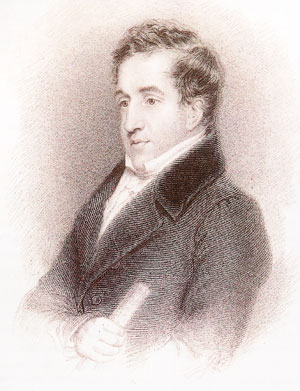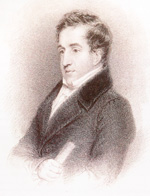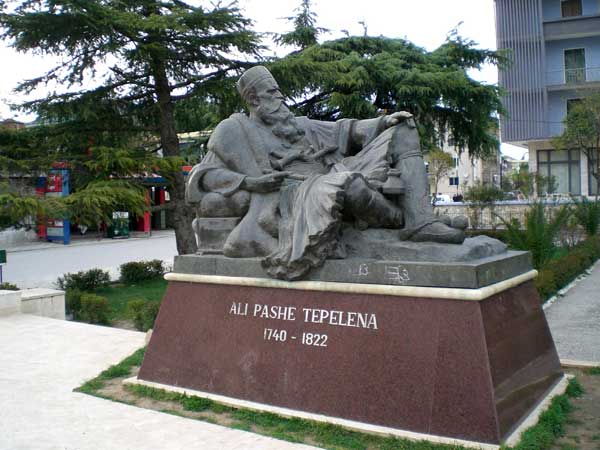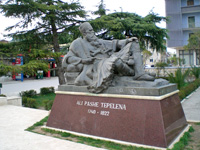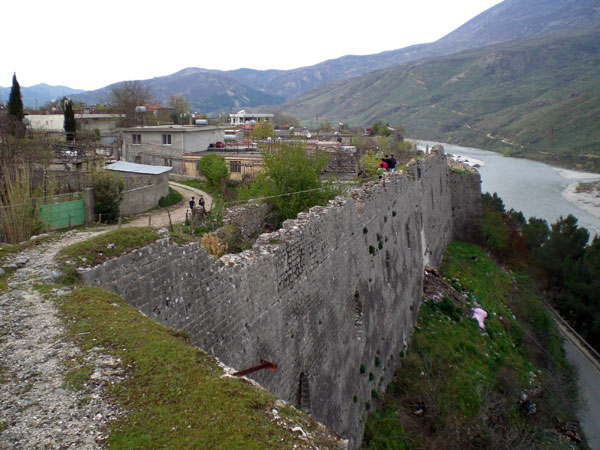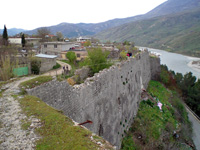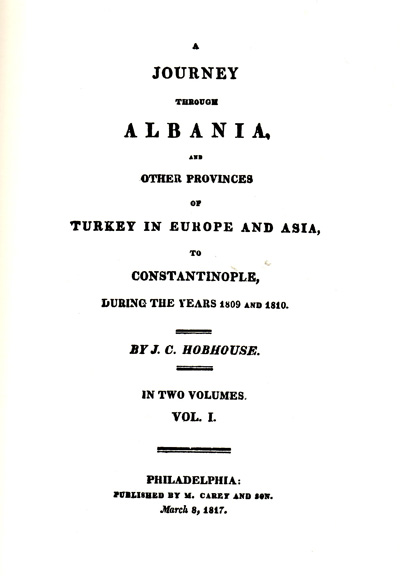| | Robert Elsie | AL Art | AL History | AL Language | AL Literature | AL Photography | Contact | |
Robert Elsie
Texts and Documents of Albanian History
BACK | AL History
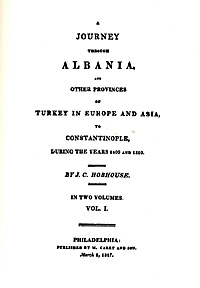
1809
John Hobhouse:
A Meeting with Ali Pasha in Tepelena
John Cam Hobhouse
by Abraham Wivell, 1834
British traveller and writer, John Cameron Hobhouse (1786-1869), also known as Lord Broughton, was born near Bristol. He was educated at Westminster School and attended Trinity College, Cambridge, where he founded the Whig Club and an Amicable Society. It was at Cambridge that he met and became an intimate friend of the poet Lord Byron, with whom he travelled in 1809-1810 to Albania, Greece and Turkey, in particular to Janina (Ioannina) and as far north as the court of Ali Pasha in Tepellenè (Tepelena). Hobhouse later became a member of parliament, served as secretary for war in the cabinet of Earl Grey in 1832 and held positions in later governments. The memoirs of his travels to Albania with Byron (whom he does not mention) were published in the volume “A Journey through Albania and Other Provinces of Turkey in Europe and Asia to Constantinople during the Years 1809 and 1810,” London 1813. The present extract describes his meeting with the formidable Ali Pasha of Tepelena in October 1809 and includes an account of the pasha’s life.
About noon, on the 12th of October, an officer of the palace, with a white wand, announced to us that we were to attend the Vizier, and accordingly we left our apartment, accompanied by our dragoman and by the Secretary, who put on his worst cloak to attend his master, that he might not appear too rich, and a fit object for extortion.
The officer proceeded us along the gallery, now crowded with soldiers, to the other wing of the building, and leading us over some rubbish where a room had fallen in, and through some shabby apartments, he ushered us into the chamber in which was Ali himself. He was standing when we came in; which was meant as a compliment, for a Turk of consequence never rises to receive anyone but his superior, and, if he wishes to be condescending, contrives to be found standing. As we advanced towards him, he seated himself, and desired us to sit down near him. He was in a large room, very handsomely furnished, and having a marble cistern and fountain in the middle, ornamented with painted tiles, of the kind which we call Dutch tile.
The Vizier was a short man, about five feet five inches in height, and very fat, though not particularly corpulent. He had a very pleasing face, fair and round, with blue quick eyes, not at all settled into a Turkish gravity. His beard was long and white, and such a one as any other Turk would have been proud of; though he, who was more taken up with his guests than himself, did not continue looking at it, nor smelling and stroking it, as is usually the custom of his countrymen, to fill up the pauses of conversation. He was not very magnificently dressed, except that his high turban, composed of many small rolls, seemed of find gold muslin, and his attaghan, or long dagger, was studded with brilliants.
He was mightily civil; and said he considered us as his children. He showed us a mountain howitzer, which was lying in his apartment, and took the opportunity of telling us that he had several large cannons. He turned round two or three times to look through an English telescope, and at last handed it to us, that we might look at a party of Turks on horseback riding along the banks of the river towards Tepellenè. He then said, “that man whom you see on the road is the chief minister of my enemy, Ibrahim Pasha, and he is now coming over to me, having deserted his master to take the stronger side.” He addressed this with a smile to the Secretary, desiring him to interpret it to us.
Statue of Ali Pasha in Tepelena
(Photo: Robert Elsie 2008)
We took pipes, coffee, and sweetmeats with him; but he did not seem so particular about these things as other Turks whom we have seen. He was in great good humour, and several times laughed aloud, which is very uncommon in a man of consequence. I never saw another instance of it in Turkey. Instead of having his room crowded with the officers of this court, which is very much the custom of the Pashas and other great men, he was quite unattended, except by four or five young persons very magnificently dressed in the Albanian habit, and having their hair flowing half-way down the backs. These brought in the refreshments, and continued supplying us with pipes, which, though perhaps not half emptied, were changed three times, as is the custom when particular honours are intended for a guest.
There are no common topics of discourse between a Turkish Vizier and a traveller, which can discover the abilities of either party, especially as these conversations are always in the form of questions and answer. However, a Frank may think his Turk above the common run, if his host does not put any very foolish interrogatories to him, and Ali did not ask us any questions that betrayed his ignorance. His liveliness and ease gave us very favourable impressions of his natural capacity.
In the evening of the next day we paid the Vizier another visit, in an apartment more elegantly furnished than the one with the fountain. Whilst we were with him, a messenger came in from “Berat,” the place which Ali’s army (of about five thousand men) was then besieging. We were not acquainted with the contents of a letter, which was read aloud, until a long gun, looking like a duck-gun, was brought into the room; and then, upon one of us asking the Secretary if there were many wild fowl in the neighbourhood, he answered, Yes, but that for the gun, it was going to the siege of Berat, there being a want of ordnance in the Vizier’s army. It was impossible not to smile at this war in miniature.
During this interview, Ali congratulated us upon the news, which had arrived a fortnight before, of the surrender of Zante, Cefalonia, Ithaca, and Cerigo, to the British Squadron; he said, he was happy to have the English for his neighbours, that he was sure they would not serve him as the Russians and French had done, in protecting his runaway robbers; that he had always been a friend to our Nation, even during our war with Turkey, and had been instrumental in bringing about a Peace.
He asked us, what had made us travel in Albania? We told him, the desire of seeing so great a man as himself. “Aye,” returned he, “did you ever hear of me in England?” We, of course, assured him, that he was a very common subject of conversation in our country; and he seemed by no means inaccessible to the flattery.
He showed us some pistols and a sabre; and then took down a gun that was hanging over his head in a bag, and told us it was a present from the King of the French. It was a short rifle, with the stock inlaid with silver, and studded with diamonds and brilliants, and looked like a handsome present; but the Secretary informed us, that when the gun came from Napoleon, it had only a common stock, and that all the ornaments had been added by his Highness, to make it look more like a royal gift.
Before we took our leave, the Vizier informed us, that there were in the neighbourhood of Tepellenè some remains of antiquity - a palaeo-castro, as all pieces of old wall, or carved stone, are called in Albania and Greece, and said that he would order some horses for us to ride to it the next morning.
According to his advice, we went on Sunday to see these ruins, which are very trifling, being only a few bits of wall, as it appeared to me, not ancient, on a hill about five miles to the north-east of Tepellenè.
In the evening of the same day, we paid his Highness our last visit. He then asked us which way we intended to go; and we told him, it was our wish to get from Ioannina to the Morea. He appeared to be acquainted with every road, and all the stages, and the state of the country most minutely. He said, that we could not go by the common road through Triccala, as that part of the country was infested by large bands of robbers; but that we might go through Carnia, crossing the gulf of Arta at Salora, or going to the head of the gulf; and that, as that country was also suspicious, he would give us orders to his several military posts, to take as many guards as might be necessary. In case, however, we should not like to go through Carnia, he furnished us with an order to his Governor at Prevesa, to send us in an armed galliot to Patrass. He also gave us a letter to his son, Veli, Pasha of the Morea, and wished to know if he could do any thing to serve us.
Walls of the Fortress of Tepelena
(Photo: Robert Elsie 2008)
We only asked permission to take our Albanian Vasilly to attend us whilst in Turkey, which he readily granted, and asked where the man was. On being informed that he was at the chamber door, he sent for him, and accordingly Vasilly entered; and, though with every proper respect, still was not embarrassed, but, with his hand on his left breast, answered the Vizier’s questions in a firm and fluent manner. Ali called him by his name, and asked him, why, being at the door, he had not come in to see him? “For you know, Vasilly,” added he, “I should have been glad to have seen you!” He then told him that he was to attend us, and see that we wanted nothing, and talked a good deal to him about the different stages of our route, summing all up by telling him in a jocose way, that if any accident happened to us, he would cut off his head; and that we were to write, mentioning how he had behaved. Shortly after this, and having agreed to give his Highness some relation of our travels by letter, we withdrew, and took our leave of this singular man, of whom this may be the place to give you a short account.
Ali was born in Tepellenè, about the year 1750; for he is now past sixty years old, though he carefully conceals his age; and, notwithstanding a disorder which he considered incurable, still carries the appearance of a healthy middle-aged man. His father was a Pasha of two tails, but of no great importance. The most considerable Prince at that time was one Cou’ Pash, Vizier, and lord of a great part of Albania. At the death of his father, Ali found himself possessed of nothing but his house at Tepellenè; and it is not only current in Albania, but reported to be the boast of the Vizier himself, that he began his fortune with sixty paras and a musket. Our attendant Vasilly (whose authority I should not mention, had it not been confirmed by every thing I heard in the country) assured me, that he recollects, when a boy, to have seen Ali (then Ali-Bey) in his father’s cottage, with his jacket out at elbows; and that, at that time, this person used to come with parties from Tepellenè in the night, and seize upon the flocks of the villages at enmity with him.
By degrees, however, he made himself master first of one village, then of another, and amassing some money, increased his power, and found himself at the head of a considerable body of Albanians, whom he paid by plunder; for he was then only a great robber, or one of those independent freebooters, of whom there are so many in the vast extent of the Turkish empire. It was not, however, without great difficulties and reverses that he continued his career, as you will think, when you hear what was said to me also by the same Vasilly; for on telling this man that the Vizier seemed well acquainted with him; “Yes,” he replied, “”he ought to be well acquainted with me; for I have come down with the men of our village, and broken his windows with shot, when he did not dare to stir out of Tepellenè.” - “Well,” he was asked, “and what did Ali do to the men of your village?” “Nothing at all; he made friends with our chief man, persuaded him to come to Tepellenè, and there roasted him on a spit; after which we submitted.”
Ali at last collected money enough to buy a pashalik (not that of Ioannina, but one of less importance), and being invested with that dignity, he was only more eager to enlarge his possessions; for he continued in constant war with the neighbouring Pashas, and finally got possession of Ioannina, of which he was confirmed Pasha by an imperial firman. He then made war on the Pashas of Arta, of Delvino, and of Ocrida, whom he subdued, together with that of Triccala, and established a very preponderating influence over the Agas of Thessaly. Giaffar, Pasha of Vallona, he poisoned by a cup of coffee, in a bath at Sophia; and he strengthened himself by marrying his two sons, Mouctar and Veli, to the daughters of Ibrahim, the successor and brother of Giaffar; since that time he has made war on Ibrahim himself, and added considerably to the territories of Ioannina, by curtailing those of his relation.
During this progress, he had been, more than once, called upon to furnish his quota of troops to the imperial armies, and had served in person against the Germans and Russians; but he knew his countrymen too well, ever to trust himself at court. He never would accept of any great office, and always found some pretence to avoid giving his personal attendance on the Grand Vizier of the day, who, it is known, had many orders to arrest him. Stories are told of the skill and courage with which he counteracted several schemes to procure his head - a present that would have been most acceptable to the Porte ever since the commencement of his career; however, he fought against Paswan Oglou, under the banners of the Sultan; and on his return from Widin, in the year 1798, was made a Pasha of three tails, or Vizier. He has had several offers of being made Grand Vizier.
He next contrived to procure pashaliks for both his sons; the younger of whom, Veli, who resembles his father in his capacity and ambition, saved money enough in his first post to buy the pashalik of the Morea, with the dignity of Vizier, for three thousand purses of five hundred piastres each. His eldest son, Mouctar, of a more warlike, but less ambitious turn than his brother, has of late supplied his father’s place at the head of the Albanians that have joined the armies of the Porte; and has greatly distinguished himself, as you must have heard, in the present war with Russia.
The difficulties which Ali had to encounter in establishing his power, did not arise so much from the opposition he met with from the neighbouring Pashas, as from the nature of the people, and of the country of which he was determined to make himself master. Many of the parts which now compose his dominions, were peopled by inhabitants who had been always in rebellion, or had never been entirely conquered by the Turks; such as the Chimeriotes, the Suliotes, and the nations living amongst the mountains in the neighbourhood of the coast of the Ionian Sea. Besides this, the woods and hills of every part of his government were, in a manner, in possession of large bands of robbers, who were recruited and protected by the villages; and who laid large tracts under contribution; burning and plundering the districts under the Pasha’s protection. Against these he proceeded with the greatest severity; they were burnt, hanged, beheaded, and impaled, and have disappeared from many parts, especially of Upper Albania, which were before quite subject to these outlaws.
A few months before our arrival in the country, a large body infesting the mountains between Ioannina and Triccala, were defeated and dispersed by Mouctar Pasha, who cut to pieces a hundred of them on the spot. These robbers had been headed by a Greek Priest, who, after the defeat of his men, went to Constantinople, procured a firman of protection, and returned to Ioannina, where the Vizier invited him to a conference, and seized him as he was leaving the room. He was detained, and well treated, in prison, until a messenger could go to and return from Constantinople, with a permission from the Porte for Ali to do what he pleased with his prisoner. It was the arm of this man which we had seen suspended from the bough, on entering Ioannina.
It is by such vigorous measures that the Vizier has rendered many parts of Albania, and the contiguous country, perfectly accessible, that were before annually overrun by robbers; and consequently by opening the country to merchants, and securing their persons and goods, has not only increased his own revenues, but bettered the condition of his subjects. He has built bridges over the rivers, raised causeways across the marshes, laid out frequent roads, adorned the country and the town with new buildings, and by many wholesome regulations has acted the part of a good and great Prince, without perhaps a single other motive than that of his own aggrandisement.
The influence of Ali extends far beyond the limits of his dominions, and is feared and felt throughout the whole of European Turkey. It would, however, be very difficult to give the actual boundaries of his present dominions; for in the extent of his territory, there is occasionally to be found an isolated district, which still resists his arms; and his attempts on the neighbouring Pashas are not always attended with success. Two months after our visit to Tepellenè, he made himself master of Berat; but my friend has written to me from Athens, that the Pasha of Scutari has retaken the city, and reinstated Ibrahim. But Ali may be again victorious; and, should he live, will, I doubt not, be master of nearly the whole of Albania.
At present, his dominions extend (taking Ioannina for a centre) one hundred and twenty miles to the north, as far as the pashalik of Ocrida; to the north-east and east of Thessaly, and touching the feet of Mount Olympus; to the south-east the small district of Thebes, and part of that attached to the Negroponte, bound his territories; which, however, on this side, include the populous city of Livadia (Lebadea) and its district, and will soon, it is expected, comprise Attica, and afterwards the above-mentioned country. To the south he commands as far as the gulf of Lepanto, and the Morea belongs to his sons. The Ionian Sea and the gulf of Venice are his boundaries in the south-west and west, and to the north-east the pashalik of Scutari, and the banks of the Drino; but on this side, the pashalik of Vallona intervenes. Parga, on the coast opposite to Corfu, belongs to the French, and the Chimeriotes can scarcely be said to depend entirely on his authority.
Throughout the whole of the country so bounded, the imperial firman is but little respected; whilst a letter with the signature of Ali (of which, as a curiosity, I send you a fac-simile), commands unlimited obedience. The Vizier is now absolute lord, as a Greek of Ioannina told me, of fifty small provinces; and should his projects of aggrandisement succeed, the countries which anciently composed the southern part of Illyricum, the kingdom of Epirus, part of Macedonia, the whole Thessalian territory, Euboea, and all the Grecian States, will be under the dominion of a barbarian who can neither write nor read. His tyranny is complete; although the form of subjection to the Porte is still preserved, and he furnishes his contingent of men to the Ottoman armies, and pays, besides, a certain part of his tribute to the Grand Signor.
As he advances to the north-west, he will be in possession of the frontier towards Dalmatia, which the views of the French must render a most important post. It is confidently asserted, that Napoleon has offered to make him King of Albania, and to support his independence against the Porte; but, if this be true, he has had the prudence to refuse a crown, which would be rather the badge of bondage than of power, and of late the Emperor has talked of thundering down upon Albania from his Illyrian provinces.
What actual resistance Ali would be able to oppose to such an enemy, it is not easy to foresee; with all his power, he has seldom kept in his pay more than eight thousand soldiers at any one time; but as every Albanian understands the use of the gun and sabre, and as religious or other prejudices, might cause the whole population to rise in arms under so fortunate a chief, the passage of the mountains might be impracticable to the French - to the soldiers who crossed the Alps.
All the Albanians, even those who have not yet submitted to his power, speak with exultation and pride of their countryman, and, by a comparison with him, they constantly depreciate the merits of others. We frequently heard them say, when talking of some other Pasha, “he is not such a one as Ali - he has not such a head.” But his death might destroy all hope of union and resistance.
The early acquisitions of this extraordinary man were made by force of arms; but his latter aggrandisements have been generally accomplished by the proper disposal of this treasures, which are reported to be very great, but the probable amount of which it is impossible to calculate. Of the tenth of all produce collected for the Porte, the Vizier has, at least, a fourth part; he has also near four hundred villages his own property; and, besides, claims from all towns and districts, arbitrary sums for protection. I have seen a computation, which sets down his revenues at 6,000,000 of piastres, independent of those casual levies, and the presents which are made to him by his Christian subjects. Add to this, that all his work is done gratis, and his kitchens and stables furnished by the towns where he has any establishment. He not only gives free quarter to himself and retinue in his numerous expeditions through his dominions, but his soldiers, who only receive about twelve piastres a month from him, are found in bread and meat wherever they go, by the inhabitants of the towns and villages; so that he is able to reserve much of his money for emergencies, for bribing the ministers of the Porte, and buying his neighbours’ territories. He is not at much expense in purchasing the male or female slaves of his household; for with these he furnishes himself from the families of the robbers whom he executes, or compels to fly. We overtook a man carrying to Tepellenè a boy and girl, who had been just found in the cottage of a robber.
Of the natured disposition of Ali we had no opportunity of forming a judgment, except by hearsay; and it would be hardly fair to believe all the stories of the Greeks, who would represent him as the most barbarous monster that ever disgraced humanity. Certainly no one but a man of a ferocious and sanguinary disposition, would have been able or willing to tame the people whom he has brought into subjection: not only beheading, but impaling and roasting, might be necessary to inspire that terror of his name, which has of itself, in many instances, given peace and security to his dominions; for large bands of robbers have submitted voluntarily, and been enrolled amongst his soldiers. Executions are now but seldom seen in Ioannina; but during the Sulliote wars, twenty and thirty prisoners were sometimes beheaded at one time in the streets of that city. Such cruelty shocks your humane feelings; but “voilà comme on juge de tout quand on n’est pas sorti de son pays.” It is not fair to appreciate the merits of any man without a reference to the character and customs of the people amongst whom he is born and educated. In Turkey the life of man is held exceedingly cheap, more so than any one who has not been in the country, would believe; and murders, which would fill all Christendom with horror, excite no sentiments of surprise or apparent disgust, either at Constantinople or in the provinces; so that what might, at first sight, appear a singular depravity of an individual, would, in the end, be found nothing but a conformity with general practice and habits. You may, therefore, transfer your abhorrence of Ali to the Turkish nation, or rather to their manners; yet I almost accuse myself of a breach of the forbearance due from a guest to his host, when I relate to you two melancholy tales, which are very well known, and are secretly talked of at Ioannina.
The wife of Mouctar Pasha, daughter of Ibrahim, was a great favourite with the Vizier; who, upon paying her a visit one morning, found her in tears. He questioned her several times as to the cause of her grief, which she at last reluctantly owned to be the diminution of his son’s affection for her. He enquired, if she thought her husband paid any attention to other women? She answered, Yes. The Vizier demanded who they were; and upon this, the lady (quite at random, it is said) wrote down the names of fifteen of the most beautiful women, some Greeks, some Turkish, in the city of Ioannina. The same night they were all seized in their houses, conveyed to the palace in the fortress, thence carried to boats on the lake, and after being tied up in sacks, were thrown into the water.
I fear there is no doubt of the truth of this story; for on mentioning the matter to our attendant, Vasilly, he said it was a fact; and that he himself, belonging at that time to the city-guard, was one of the thirty soldiers employed to seize and destroy these unfortunate females. It may seem strange, that thirty men should be found capable of performing such an office; but the Albanians despise the sex; and our soldier defended the action, which, said he, was a very good one, for they were all bad women. It is not impossible, that this ruffian seriously considered himself as having been concerned in the suppression of vice.
The fate of the beautiful Zofreni is still the subject of a lamentable ditty, which we heard first at Ioannina, and afterwards at Athens. The story goes, that it was the misfortune of Zofreni, a Greek lady of Ioannina, the most lovely of her sex, to be admired at the same time by Ali and by one of his sons; and that she contrived to conceal this double attachment from both her lovers, till the Vizier recognised upon her finger, a ring which he had given to his son’s wife. Upon this discovery, the angry father left her abruptly, and gave the fatal orders. Zofreni was drowned the same night. She was only seventeen years of age.
Here again is a trait of Turkish ferocity, rather than of a savage disposition peculiar to Ali; for there is nothing unusual in this manner of punishing women: Hairactar, the famous Grand Vizier, disposed of many of Sultan Mustapha’s harem by the same death, in order to decrease the expenses of the seraglio, or, as some say, to punish them for supposed court intrigues.
After what has been stated, you need scarcely be informed that Ali indulges to the full in all the pleasures that are licensed by the custom of the country. His harem is said to contain three hundred women. His other gratifications cannot be various or refined.
Amongst the attendants at Tepellenè we saw the court fool, who was distinguished by a very high round cap of fur; but, unlike the ancient fools of more civilised monarchs, this fellow is obliged to confine his humour to gambolling, cutting capers, and tumbling before the Vizier’s horse, when his Highness takes a ride.
In his younger years, Ali was not a very strict Mahometan; but he has lately become religious, and entertains several Dervishes at his court; yet he does not at all relax in his ambitious efforts; and having no use for books, employs all the hours that he is absent from his harem in designs of future conquest. He is still an active horseman, and there is scarcely a village in his dominion which he does not visit once a year. I believe him, from good authority, never to have received even the education usually given to the Albanians. Besides his native tongue, he talks Greek fluently, but of the Turkish language he knows very little; and, like Justin and Theodoric, the contemporary lords of the Eastern and Western Empires, has raised himself to his present power, without perhaps knowing the letters of any alphabet.
He is doubtless a great man; but without saying or knowing that he is the worthy successor of Pyrrhus, whom, according to one author (Survey of the Turkish Empire, page 373), he is accustomed to call Piros, and, as another will have it (Voyage en Albanie, page 24), Bourrous. But he that does not smile at Mr Eton may believe Doctor Pouqueville.
Yours &c, &c.
[extract from: John Cameron Hobhouse: A Journey through Albania and Other Provinces of Turkey in Europe and Asia to Constantinople during the Years 1809 and 1810, London 1813, re-edited as A Journey through Albania, New York 1971, p. 101-113.]
TOP
